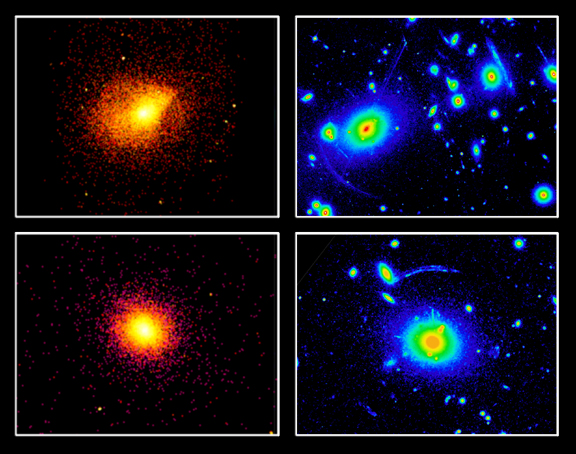 |
Астронет: Астрономическая картинка дня Вещество в скоплениях галактик http://www.astronet.ru/db/msg/1171939/eng |
Credit: S. Allen (IoA Cambridge) et al.,
NASA
Explanation:
Situated over 2,000,000,000 (two billion)
light-years from Earth, galaxies in cluster Abell 2390 (top) and
MS2137.3-2353 (bottom)
are seen in the right hand panels above,
false-color images from the
Hubble
Space Telescope.
Corresponding panels on the left reveal each cluster's
x-ray
appearance in images from the Chandra X-ray Observatory.
While the Hubble images record the cluster's star-filled galaxies,
the x-ray images show no galaxies at all ... only
multi-million degree hot intracluster gas
which glows in high energy x-rays.
But there lies a profound mystery.
The total mass in the galaxies on the right, plus the
mass of the hot gas on the left, falls far short of providing enough gravity
to confine the hot gas within
the galaxy clusters.
In fact,
the best accounting to date
can only find 13 per cent (!)
of the total matter necessary.
Gravitational lens
arcs visible in the deep Hubble images
also indicate these clusters have much more mass than directly identifiable
in the Chandra and Hubble data.
Astronomers conclude that most of the cluster matter is
dark matter,
invisible even to the combined far-seeing eyes of these orbiting
astrophysical observatories.
What is the
nature of this cosmic dark matter?
Tomorrow's picture: Mars Odyssey
Authors & editors:
Robert Nemiroff
(MTU) &
Jerry Bonnell
(USRA)
NASA Web Site Statements, Warnings,
and Disclaimers
NASA Official: Jay Norris.
Specific
rights apply.
A service of:
LHEA at
NASA /
GSFC
& Michigan Tech. U.
